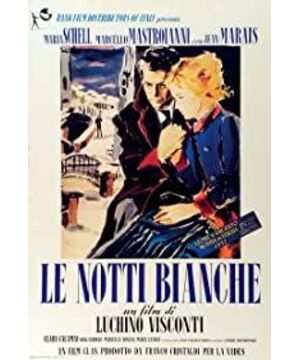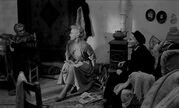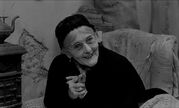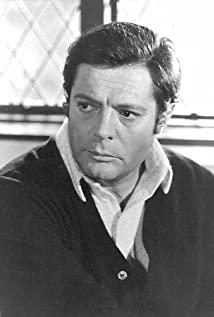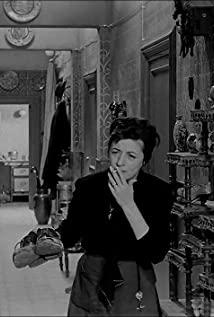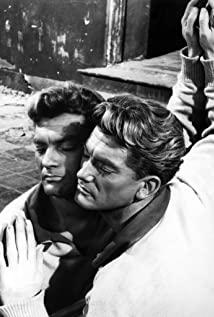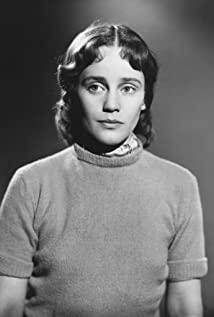"White Nights" was originally a novel by Dostoevsky, belonging to the "pre-Siberian" period of the great Russian genius. Like "Insulted and Damaged", this novel reveals the romantic and melancholy temperament of the early Tuo.
It is said that this novel has been adapted into a film at least 5 times, and the ones I have watched besides Visconti's, and Bresson's 1971 "Four Nights of the Dreamer". What makes so many directors interested may be the tragic nature of the story itself: the young man who loves to dream meets the ideal girl, but she has a place in her heart. When he moves her heart step by step with sincerity and enthusiasm, let him When she almost had the hallucination of falling in love with him, the lover she was waiting for appeared again, so the dream was shattered, the strong and fiery feelings were forced to abruptly stop, and the young man could only bless the beloved girl with bitterness and tears. This is a typical "parting love" story, a story about the "impermanence" of life that shreds the dreams of idealists, and the grief of life itself that exists in any era and anywhere. This story is also about the promise and belief of love. The girl and her lover met again on this bridge after a year of appointment, so the girl "never betrayed him in thought" for a year, and in a year Years later, I waited for him on the bridge every night, but he didn't show up for some reason. On the last night, the sad and desperate girl fell into the illusion of love for young people. They danced and talked together, but when the clock struck 10 o'clock, the girl instinctively dropped everything and rushed to the bridge again. . In our age when we dare not promise lightly and believe almost nothing, such promises and keeping, love and faith are rare, and only in the imagination of poets, and only in a girl as pure as Natalie in the movie. , but it moved us so much.
Such a theme is not easy to deal with in a movie, and it is easy for the audience to feel contrived and disgusted. Maria Schell's Natalie is a true angel, a pure and ignorant girl next door with a child's heart untouched by any evil or lust. In Dostoevsky's original novel, there is undoubtedly a shadow of the Virgin behind such a girl. Mario, played by Marcello Mastroianni, is a typical daydream youth. Of all the movies I've seen starring Marcello, this Mario is undoubtedly the cutest. When the last girl leaves, the close-up of Mario's tearful face of sadness and despair shows the full pain of a young man who has just "first love" after losing his love. This treatment focuses the audience's sympathy entirely on Mario and reinforces the film's theme of "disillusionment with love", in contrast, Natalie's lover's few minutes in the film appear more "banal" than Mario's. ”, the connotation of the oath of love and faithfulness is therefore weaker.
The place where the story takes place is Venice, the water city, but the water city in the movie was built entirely in the studio. This is a completely enclosed space, and all the small scenes and even the weather can be controlled by the director. This "Venice" appears in several "white nights" in a row, and the night scenes are very dreamy, in harmony with the romantic and sad emotional tone of the story itself. Visconti was one of the early initiators of the Italian neorealist movement, and the stories shot in this studio did not completely violate the idea of neorealism. Instead of organizing all of the shots around Mario and Natalie's love, the film puts the young couple's story in a stream of life where all sorts of random events can occur. On the bridge the girl was waiting for, a prostitute in black appeared several times (perhaps there was a devil hidden beside every angel), and Mario finally had a conflict with her. Mario takes Natalie to his "secret spot" under a bridge, only to find that the bridge is already occupied by homeless people, which amounts to an accidental bump. And Mario's roaming the streets, the pretty woman he accosts him, and the dance performance Mario and Natalie see in a restaurant at the end, these details have a double meaning at the same time: they create the love in the movie The romance of the story also gives the story the authenticity of the objective environment. In this way, the story will not arouse the audience's disgust by appearing to be as illusory as a castle in the sky.
———————————————
Personal public account: Gashua
is updating India's travel diary on the road, welcome to pay attention!
View more about Le Notti Bianche reviews


